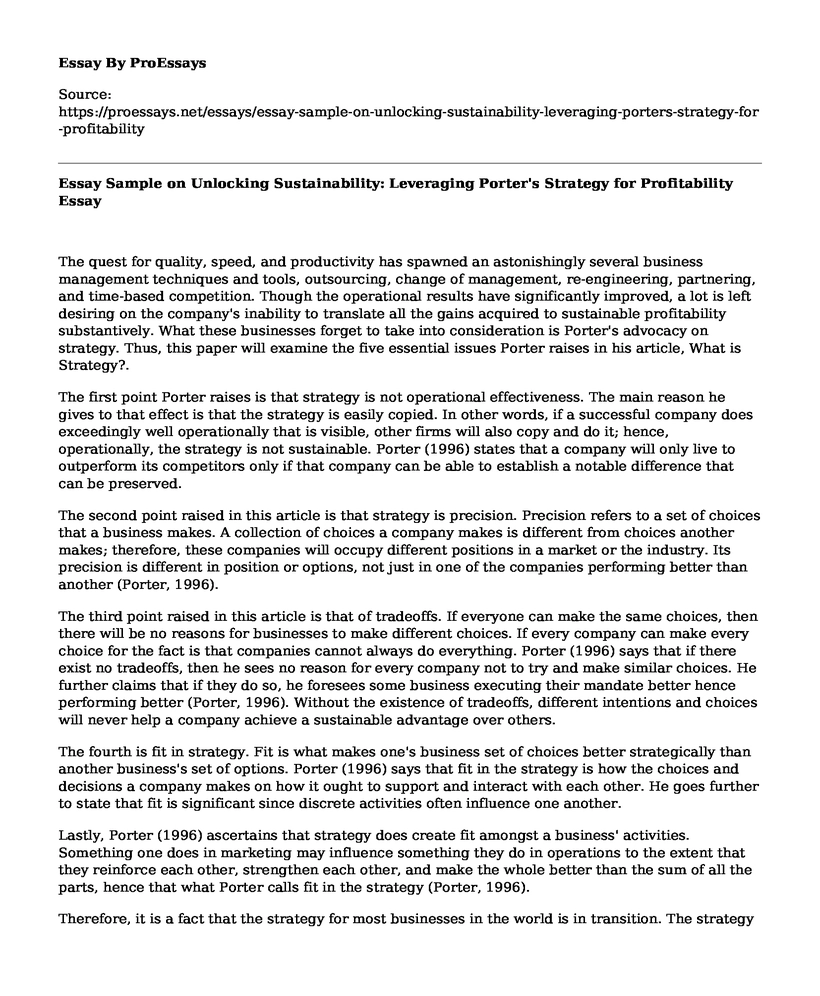The quest for quality, speed, and productivity has spawned an astonishingly several business management techniques and tools, outsourcing, change of management, re-engineering, partnering, and time-based competition. Though the operational results have significantly improved, a lot is left desiring on the company's inability to translate all the gains acquired to sustainable profitability substantively. What these businesses forget to take into consideration is Porter's advocacy on strategy. Thus, this paper will examine the five essential issues Porter raises in his article, What is Strategy?.
The first point Porter raises is that strategy is not operational effectiveness. The main reason he gives to that effect is that the strategy is easily copied. In other words, if a successful company does exceedingly well operationally that is visible, other firms will also copy and do it; hence, operationally, the strategy is not sustainable. Porter (1996) states that a company will only live to outperform its competitors only if that company can be able to establish a notable difference that can be preserved.
The second point raised in this article is that strategy is precision. Precision refers to a set of choices that a business makes. A collection of choices a company makes is different from choices another makes; therefore, these companies will occupy different positions in a market or the industry. Its precision is different in position or options, not just in one of the companies performing better than another (Porter, 1996).
The third point raised in this article is that of tradeoffs. If everyone can make the same choices, then there will be no reasons for businesses to make different choices. If every company can make every choice for the fact is that companies cannot always do everything. Porter (1996) says that if there exist no tradeoffs, then he sees no reason for every company not to try and make similar choices. He further claims that if they do so, he foresees some business executing their mandate better hence performing better (Porter, 1996). Without the existence of tradeoffs, different intentions and choices will never help a company achieve a sustainable advantage over others.
The fourth is fit in strategy. Fit is what makes one's business set of choices better strategically than another business's set of options. Porter (1996) says that fit in the strategy is how the choices and decisions a company makes on how it ought to support and interact with each other. He goes further to state that fit is significant since discrete activities often influence one another.
Lastly, Porter (1996) ascertains that strategy does create fit amongst a business' activities. Something one does in marketing may influence something they do in operations to the extent that they reinforce each other, strengthen each other, and make the whole better than the sum of all the parts, hence that what Porter calls fit in the strategy (Porter, 1996).
Therefore, it is a fact that the strategy for most businesses in the world is in transition. The strategy used to work effectively is no longer efficient. In today's world, business competitive advantage and value arise more from the consumer discernment of what is good other than the economies of scale and physical assets.
Reference
Porter, M. E. (1996). What is Strategy?. Harvard business review, 74(6), 61-78.
Cite this page
Essay Sample on Unlocking Sustainability: Leveraging Porter's Strategy for Profitability. (2023, Mar 27). Retrieved from https://proessays.net/essays/essay-sample-on-unlocking-sustainability-leveraging-porters-strategy-for-profitability
If you are the original author of this essay and no longer wish to have it published on the ProEssays website, please click below to request its removal:
- Management Essay Example: Servant Leadership and Fortuitous Encounters
- Case Study: Joint Venture Between Health Snacks and Toka Foods
- Philosophy of Leadership Statement Essay Example
- Essay on Contingency Theory: No One-Size-Fits-All Leadership and Decision-Making
- Paper Example on Innovation: A Catalyst for Business Growth
- Positive Risk: Unlocking Opportunities for Projects - Essay Sample
- Essay on Verbal Rumination in the Workplace: Negative Impacts & Solutions







